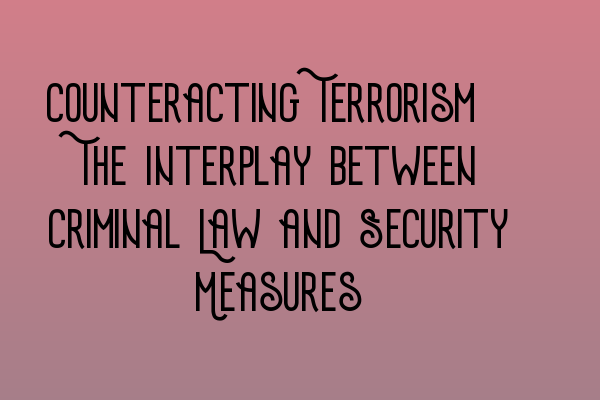Counteracting Terrorism: The Interplay between Criminal Law and Security Measures
In today’s world, the rise of global terrorism has become a pressing concern for governments and societies alike. As acts of terrorism continue to threaten the safety and security of nations, it becomes imperative to explore the interplay between criminal law and security measures in order to effectively counteract this menace.
Criminal law plays a vital role in combating terrorism by providing the legal framework to identify, investigate, prosecute, and punish individuals involved in terrorist activities. It establishes various offenses related to terrorism, such as terrorist financing, recruitment, planning, and carrying out acts of violence. By enforcing these laws, authorities can hold perpetrators accountable and deter potential individuals who are considering engaging in terrorism.
One of the key aspects in counteracting terrorism is the use of security measures. These measures aim to prevent acts of terrorism and protect the general population. Security measures encompass a wide range of strategies, including intelligence gathering, surveillance, border control, and emergency response protocols. SQE 2 Preparation Courses often delve into these topics to equip legal professionals with the knowledge necessary to understand and navigate the intricacies of counterterrorism measures.
A crucial challenge in finding the right balance between criminal law and security measures lies in the preservation of civil liberties. While it is essential to ensure the safety of citizens, it is equally important to respect individual rights and freedoms. Striking this delicate balance requires a thorough understanding of legal principles and a careful evaluation of the necessity and proportionality of each security measure implemented.
The interplay between criminal law and security measures can be seen in various stages of the counterterrorism process. The gathering and analysis of intelligence, for example, are instrumental in identifying individuals or groups involved in planning terrorist activities. This information is then used to initiate criminal investigations and gather evidence in accordance with the principles of criminal law.
Effective collaboration among law enforcement, intelligence agencies, and legal professionals is crucial in combating terrorism. By sharing information and expertise, they can work together to apprehend suspects and prevent terrorist acts. Organizations such as the SQE 1 Practice Exam Questions specialize in imparting knowledge and skills required for aspiring legal professionals to contribute effectively to the fight against terrorism.
Furthermore, international cooperation plays a key role in counteracting terrorism. As terrorism knows no boundaries, it becomes essential for nations to work together and share best practices in the prevention, investigation, and prosecution of terrorist activities. Frameworks such as the United Nations’ Global Counter-Terrorism Strategy facilitate such cooperation and provide a platform for nations to strengthen their collective efforts.
In conclusion, the fight against terrorism requires a multifaceted approach that integrates criminal law and security measures. By utilizing criminal law to establish offenses, prosecute perpetrators, and uphold the rule of law, while implementing appropriate security measures to prevent acts of terrorism, nations can work towards a safer and more secure future. Legal professionals, equipped with the right knowledge and expertise from SQE 1 Practice Mocks FLK1 FLK2, play a pivotal role in this endeavor by upholding justice, ensuring civil liberties, and protecting society from the threats posed by terrorism.
For more information on the SQE exams and important dates, please visit the SRA SQE Exam Dates page.
